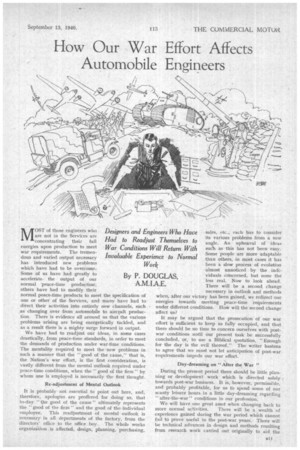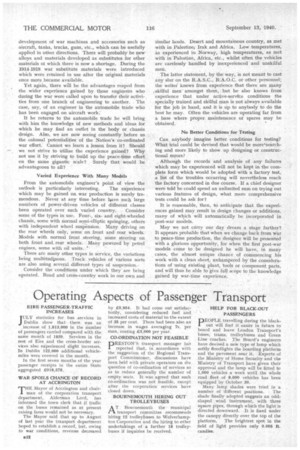How Our War Effort Affects Automobile Engineers
Page 29

Page 30

If you've noticed an error in this article please click here to report it so we can fix it.
MOST of those engineers who are not in the Services are concentrating their full energies upon production to meet war requirements. The tremendous and varied output necessary has introduced new problems which have had to be overcome. Some of us have had greatly to acceleratethe output of our normal peace-time production; others have had to modify their
normal peace-time products to meet the specification of one or other of the Services, and many have had to direct their activities into entirely new channels, such as changing over from automobile to aircraft production. There is evidence all around us that the various problems arising are being energetically tackled, and as a result there is a mighty surge forward in output.
We have had to readjust our ideas, in some cases drastically, from peace-time standards, in order to meet the demands of production under war-time conditions. The mentality required to meet the new problems in such a manner that the "good of the cause," that is, the Nation's war effort, is the first consideration, is vastly different from the mental outlook required under peace-time conditions, when the "good of the firm" by whom one is employed is necessarily the first thought.
Re-adjustment of Mental Outlook
It is probably not essential to point out here, and, therefore, apologies are proffered for doing so, that to-day "the good of the cause" ultimately represents the, " good of the firm" and the good of the individual employee. This readjustment of mental outlook is necessary in aff departments of the factory, from the directors' office to the office boy. The whole works organization is affected, design, planning, purchasing,
sales, etc., each has to consider its various problems from a new angle. An upheaval of ideas such as this has not been easy. Some people are more adaptable than others, in most cases it has been a slow process of evolution almost unnoticed by the individuals ccincerned, but none the less real. Now to look ahead. There will be a second change necessary in outlook and methods when, after our victory has been gained, we redirect-our energies towards meeting peace-time requirements under different conditions. How will the second change affect us?
It may be argued that the prosecution of our war effort is sufficient to keep us fully occupied, and that there should be no time to concern ourselves with postwar conditions until our present task be successfully concluded, or, to use a Biblical quotation, "Enough for the day is the evil thereof." The writer hastens to agree that we must not let anticipation of post-war requirements impede our war effort.
Day-dreaming on "After the War "
During the present period there should be little planning or development work which is directed solely towards post-war business. It is, however, permissible, and probably profitable, for us to spend some of our scanty leisure hours in a little day-dreaming regarding " after-the-war" conditions in our profession.
We will have one great asset when changing back to more normal activities. There will be a wealth of experience gained during the war period which cannot fail to prove useful in the post-war years. There will be technical advances in design and methods resulting from research work carried out originally to aid the development of war machines and accessories such as aircraft, tanks, trucks, guns, etc., which can be usefully applied in other directions. There will probably be new alloys and materials developed as substitutes for other materials of which there is now a shortage. During the 1914-1918 war substitute materials were introduced which were retained in use after the original materials once more became available.
Yet again, there will be the advantages reaped from the wider experience gained by those engineers who during the war were called upon to transfer their activities from one branch of engineering to another. The case, say, of an engineer in the automobile trade who has been engaged on aircraft work:
If he returns to the automobile trade he will bring with him the knowledge of new methods and ideas for which he may find an outlet in the body or chassis design. Also, we are now seeing constantly before us the colossal potentialities of the Nation's co-ordinated war effort. Cannot we learn a lesson from it? Should we not strive to utilize the experience gained? Why not use it by striving to build up the peace-time effort on the same gigantic scale? Surely that would be advantageous to all?
Varied Experience With Many Models From the automobile engineer's point of view the outlook is particularly interesting. The experience which may be gained on war production is surely tremendous. Never at any time before have such large numbers of power-driven vehicles of different classes
been operated over such varied country. Consider some of the types in use. Four-, sixand eight-wheeled chassis, some with normal semi-elliptic springing, others with independent wheel suspension.' Many driving on the rear wheels only, some on front and rear wheels. Models with normal front steering, some steering on both front and rear wheels. Many powered by petrol engines, some with oil units..•
There are many other types in service, the variations being multitudinous. Track vehicles of various sorts are also using several different types of suspension.• Consider the conditions under which they are being operated. Road and cross-country work in our own and
'similar lands. Desert and mountainous country, as met with in Palestine Irak and Africa. Low temperatures, as experienced in Norway, high temperatures, as met with in Palestine, Africa, etc., whilst often the vehicles are carelessly handled by inexperienced and unskilful men.
The latter statement, by the way, is not meant to cast any slur on the R.A.S.C., R.A.O.C. or other personnel: the writerknows from experience that there are many , skilful men amongst them, but he also knows from experience that under active-service conditions the specially trained and skilful man is not always available for the job in hand, and it is up to anybody to do the best he may. Often the vehicles are operating far from a base where proper maintenance or spares may be obtained.
No Better Conditions for Testing
Can anybody imagine better conditions for testing? What trial could be devised that would be more*searching and more likely to show up designing or constructional errors?
Although the records and analysis of any failures which may be experienced will not be kept in the complete form which would be adopted with a factory test, a list of the troubles occurring will nevertheless reach the factory concerned in due course. If a chief designer were told he could spend an unlimited sum on trying out various features of design, what more comprehensive tests could he ask for?
It is reasonable, then, to anticipate that the experiences gained may result in design changes or additions, many of which will automatically be incorporated in post-war models.
May we not carry our day dream a stage further? It appears probable that when we change back from war to peace-time production, the designer will be presented with a glorious opportunity, for when the first post-war models come to be designed he will have, in many cases, the almost unique chance of commencing his work with a clean sheet, unhampered by the considerations of using existing plant, tools or component parts, and will thus be able to give full scope to the knowledge gained by war-time experience.




















































